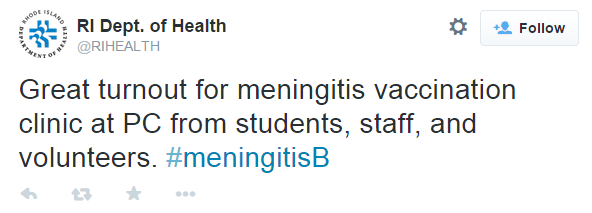Following the confirmation of two students contracted meningococcal meningitis at Providence College in Rhode Island, school officials announced the opening of a vaccination clinic today.
 The type of meningitis that has been confirmed in one of the students at Providence College is the serogroup (or type) B meningitis. People are vaccinated against other strains of meningitis when they are adolescents, but serogroup B (also called meningitis B) is not included in the routine vaccine given.
The type of meningitis that has been confirmed in one of the students at Providence College is the serogroup (or type) B meningitis. People are vaccinated against other strains of meningitis when they are adolescents, but serogroup B (also called meningitis B) is not included in the routine vaccine given.
The College has worked closely with the Rhode Island Department of Health (HEALTH) and the Centers for Disease Control and Prevention (CDC) to obtain a supply of Trumenba, a meningitis B vaccine made by Pfizer. This vaccine was approved by the US Food and Drug Administration (FDA) in October 2014. The vaccine requires three doses.
The first of these three doses were available today (see vaccination schedule here.) There will be an additional clinic on Wednesday, February 10th for students who are away from campus or who cannot attend on Sunday.
Vaccinations are recommended for PC’s roughly 3,800 undergraduate students, graduate students living on campus, and staff who are under 25 years old and/or have a suppressed immune system. Once the logistics of the clinic have been determined, Providence College will communicate that information to students and to its campus community.
“The spread of meningococcal disease can be stopped by good public health practices,” said Michael Fine, M.D., Director of the Rhode Island Department of Health. “The first step of the response is well underway to provide all close contacts of these students with preventive antibiotics. The action we’re taking today is an important next step to keep the PC community healthy.”
Meningococcal meningitis is an infection of the lining that surrounds the brain and spinal cord. The bacterial infection is spread through direct secretions from the nose or mouth through activities such as kissing, sharing food, drinks, water bottles, toothbrushes, eating utensils, or cigarettes. Meningococcal disease can be treated with antibiotics, but quick medical attention is extremely important.


One thought on “Providence College offers Trumenba meningitis B vaccine”